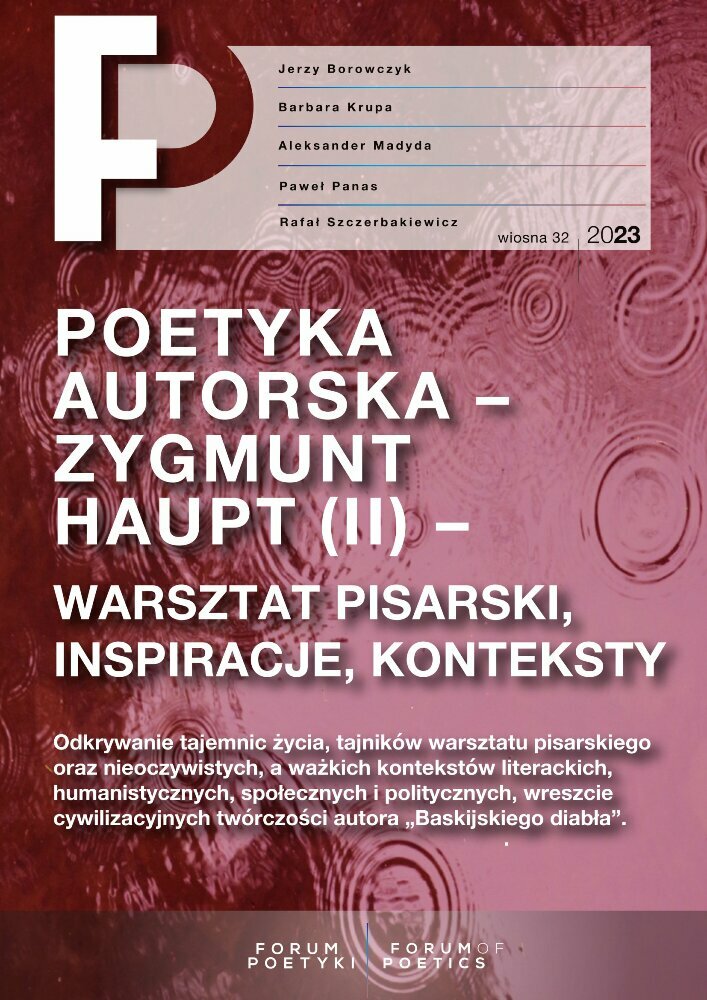Abstract
With the tools borrowed from the psychoanalytical theory of Sigmund Freud and Jacques Lacan, this article discusses the topic of the represented world, and especially literary characters, in the prose of Zygmunt Haupt. The concept of the drive presented as an artistic montage – as developed by Lacan – turns out to be particularly useful in the analysis of literary portraits depicted by Haupt. Constructed as a montage of memories, this prose points to the very mechanism of imaginary representation driven by what is described by Freud as “drive-spring”. It constructs a stage on which individual characters are presented; it drives them as characters. It is also a metaphor describing the mechanisms of remembering and writing. Propelled by the “drive-spring” those literary characters resemble dolls or mannequins; they also point to the surrealist tradition within which these literary representations can be located.
References
Breton, André. „Manifest surrealizmu”. W: Surrealizm. Antologia, wybór i tłum. Adam Ważyk, wyd. 2, 55–102. Warszawa: Czytelnik, 1976.
Fazan, Katarzyna. Kantor. Nie/obecność. Kraków: Wydawnictwo Uniwersytetu Jagiellońskiego, 2019.
Freud, Sigmund. „Dowcip i jego stosunek do nieświadomości”. W: Pisma psychologiczne, tłum. Robert Reszke, 5–211. Warszawa: Wydawnictwo KR, 1997. Wydanie niemieckie: „Der Witz und seine Beziehung zum Unbewussten”. W: Gesammelte Werke, t. 6, red. Anna Freud. London: Imago, 1940.
Freud, Sigmund. „Kultura jako źródło cierpień”. W: Pisma społeczne, tłum. Aleksander Ochocki, Marcin Poręba, Robert Reszke, oprac. Robert Reszke, 163–227. Warszawa: Wydawnictwo KR, 1998.
Freud, Sigmund. „Nieświadomość”. W: Psychologia nieświadomości, tłum. Robert Reszke, 89–129. Warszawa: Wydawnictwo KR, 2009.
Freud, Sigmund. Objaśnianie marzeń sennych. Tłum. Robert Reszke. Warszawa: Wydawnictwo KR, 2007. Wydanie niemieckie: Die Traumdeutung. Red. Alexander Mitscherlich, Angela Richards. Frankfurt am Main: Fischer Taschenbuch Verlag, 1961.
Freud, Sigmund. „Totem i tabu”. W: Pisma społeczne, tłum. Aleksander Ochocki, Marcin Poręba, Robert Reszke, oprac. Robert Reszke, 241–375. Warszawa: Wydawnictwo KR, 1998.
Freud, Sigmund. „Żałoba i melancholia”. W: Psychologia nieświadomości, tłum. Robert Reszke, 145–159. Warszawa: Wydawnictwo KR, 2009.
Haupt, Zygmunt. Baskijski diabeł. Opowiadania i reportaże. Wydanie 2. Zebrał, oprac. i notą edytorską opatrzył Aleksander Madyda. Wstęp Andrzej Stasiuk. Wołowiec: Czarne, 2016.
Haupt, Zygmunt. Z Roksolanii. Opowiadania, eseje, reportaże, publicystyka, warianty, fragmenty (1935–1975). Wydanie 2. Zebrał, oprac. i notą edytorską opatrzył Aleksander Madyda. Toruń: Wydawnictwo Naukowe UMK, 2018.
Lacan, Jacques. Funkcja i pole mówienia i mowy w psychoanalizie. Tłum. Barbara Gorczyca, Wincenty Grajewski. Warszawa: Wydawnictwo KR, 1996.
Lacan, Jacques. Seminarium III. Psychozy. Oprac. Jacques-Alain Miller, tłum. Jacek Waga. Warszawa: Wydawnictwo Naukowe PWN, 2014. Wydanie francuskie: Le séminaire de Jacques Lacan, Livre III: Les psychoses 1955–1956. Red. Jacques-Alain Miller. Paris: Seuil, 1981.
Lacan, Jacques. Le séminaire de Jacques Lacan, Livre XI: Les quatre concepts fondamentaux de la psychanalyse 1964. Red. Jacques-Alain Miller. Paris: Seuil, 1973.
Mitchell, W.J.T. Czego chcą obrazy? Pragnienia przedstawień, życie i miłości obrazów. Tłum. Łukasz Zaremba. Warszawa: Narodowe Centrum Kultury, 2013.
Roudinesco, Elisabeth. Jacques Lacan. Jego życie i myśl. Tłum. Robert Reszke, Warszawa: Wydawnictwo KR, 2005.
Wiegandt, Ewa. „Wszystko-nic Zygmunta Haupta”. W: Niepokoje literatury. Studia o prozie polskiej XX wieku, 199–214. Poznań: Wydawnictwo Wojewódzkiej Biblioteki Publicznej i Centrum Animacji Kultury, 2010.
Wittlin, Józef. Mój Lwów. Wydanie IV. Wrocław: Wrocławskie Wydawnictwo Warstwy, 2017
License
Copyright (c) 2023 Michał Zając

This work is licensed under a Creative Commons Attribution-NonCommercial-NoDerivatives 4.0 International License.
Authors of articles are responsible for securing the rights to other publications (texts, tables, drawings and other illustrations) quoted or reproduced in their texts.

